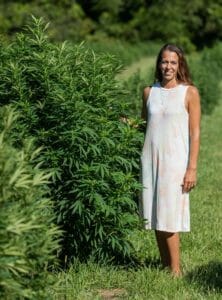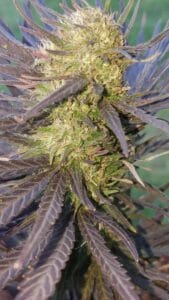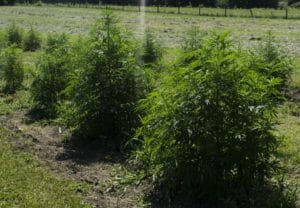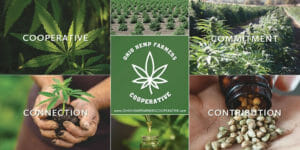Julie Doran, founder of the Ohio Hemp Farmers Cooperative and the Hemp Farm Summit in Columbus, talks about harvesting her first 5-acre crop in the fall. Some regulation is necessary to ensure that farmers are growing legal hemp rather than illegal marijuana, but she says the present restrictions make it tough for farmers to survive. She’s been lobbying the state to regulate hemp the way it regulates other crops. Doran, owner of Meigs  fertilizer, says change in the current laws are necessary in order for Ohio hemp farmers to compete in this new industry.
fertilizer, says change in the current laws are necessary in order for Ohio hemp farmers to compete in this new industry.
How did you get into farming hemp? I’ve always been in the cannabis industry as an advocate and I’m a farmer at heart. I had already manufactured fertilizer in a family business before I started my own company, Meigs fertilizer. Almost 10 years ago I started studying soil, specifically as it relates to nutrients and what the cannabis plant takes out of the soil. In 2016, I started studying cannabinoids, I’m not all about hemp. I’m all about cannabis.
I understand that cannabis and hemp both come from the same plant, but it sounds like you’re more passionate about cannabis. Is that correct? The plant is medicine. I hear so many stories about how its helped so many people. My diabetic father was on 15 pills a day and within a few weeks he was able to cut out half of the pills because of hemp-derived CBD oil. I gave him 1000 mg tincture of CBD, with no THC. He was hesitant to try it, but I told him it can’t be any worse than taking all of those pills.
When did you start advocating for legal hemp in Ohio? In Ohio growing legalized industrial hemp became legal in July 2019. The bill legalized the cultivation, processing, manufacturing, and selling hemp and hemp-derived products like CBD oil and hemp flower. I started reaching out to legislators in 2014 because I was trying to get a pilot program here. I knew that states that had research pilot programs were able to work out some of the challenges that come with any new industry. Other states put their own rules and regulations together based on seeing how the plant grows.
We never did get a pilot program in Ohio and our rules are a lot stricter than other states as a result. But I started emailing and calling legislators in 2016 and 2017. When Ohio’s medical cannabis program became legal I was downtown all of the time, trying to educate legislators. It’s the same plant. For about 6 months I was at the statehouse two to three days a week, trying to find out when was their first appointment.
Education is key. Is that the reason you started the Hemp Summit? Yes. It’s the same reason I started the co-op. Farmers need help with both making purchases and growing hemp and I wanted to play a role in educating farmers. We have a lot of challenges including having a minimum of 1,000 plants. Farmers aren’t going to try to get into this industry if they don’t know anything about it. And through the co-op we can buy seeds in bulk, along with fertilizers, lights, growing supplies and other equipment.
 What’s the biggest lesson you learned about planting and harvesting in 2020? Do not underestimate time and labor. A lot of people underestimate the time and attention it takes to grow this plant. It’s not like other crops where you can just plant, water and harvest later. Growing hemp involves being out there every day pulling weeds and paying attention to bugs and growing challenges like rain. You need to use different techniques depending on the situation. With five acres I had three to five people out there for four months from June to September. Then for two weeks it took 7 to 9 people for harvest.
What’s the biggest lesson you learned about planting and harvesting in 2020? Do not underestimate time and labor. A lot of people underestimate the time and attention it takes to grow this plant. It’s not like other crops where you can just plant, water and harvest later. Growing hemp involves being out there every day pulling weeds and paying attention to bugs and growing challenges like rain. You need to use different techniques depending on the situation. With five acres I had three to five people out there for four months from June to September. Then for two weeks it took 7 to 9 people for harvest.
Hemp and marijuana are different species from the same plant.
One reason people value hemp is for an ingredient called cannabidiol or CBD, which many believe has medicinal qualities. Marijuana is grown for tetrahydrocannabinol, or THC, which produces the “high.” Since hemp only has trace amounts of THC and the new law specifies it cannot have more than 0.3 percent of THC, is this a problem with growing hemp?
Yes. Any cannabis that exceeds that threshold is considered marijuana. Regulations surrounding hemp and THC are making things difficult. Right now, in Ohio, hemp is tested for total THC. Some states that had pilot research programs, however, test based on the Delta-9 THC levels, which makes the 0.3% limit easier to stay under.
So why are farmers being forced to destroy plants?
Medical grade marijuana typically has 20% THC. Though 0.3% isn’t enough to have psychoactive effects, plants above that level are legally considered marijuana and must be destroyed. It’s a major loss for farmers when their crops test hot.
 Can Ohio farmers be competitive in the national marketplace?
Can Ohio farmers be competitive in the national marketplace?
No they can’t, at least not right now. I’m embarrassed to be part of the hemp program in Ohio.
I’m hoping to see the THC level requirements made more lenient, or to see the U.S. Department of Agriculture allow farmers and states to test according to Delta-9 THC instead of total THC. Total THC includes Delta-9 THC and THCA, a non-psychoactive component that can be converted to THC.
You can have 100 analysis on one variety or strain. Every branch on a plant will test differently.
It’s a plant. Why do we need all of these rules? When you’re competing against the rest of the nation and you have only half of the CBD, nobody wants your product. it takes twice the amount of product to equal their CBD content (extraction). For instance, 50 pounds of hemp grown in Kentucky to produce a kilo of isolate – would take 100 pounds of hemp in Ohio to produce that same kilo of isolate. You’re extracting everything for CBD content, but as the plant matures it continues to get higher, and then you have marijuana.
Nearly 200 Ohioans have a license to grow hemp so far, and last year’s crop served as a trial run for both farmers and the regulators. Some regulation is necessary to ensure that farmers are growing legal hemp rather than illegal marijuana. As the head of the Ohio Hemp Farmers Cooperative, can you share a bit on how things worked out for most of the farmers in 2020?
A good majority of farmers in Ohio failed or just didn’t harvest their crop due to lack of labor or preparation. Even if you were a successful hemp farmer in Ohio you have no where to go in Ohio for extraction. You can’t take it to a medical marijuana processor, and the state has no hemp extractors.
I’m wondering what you do when you’re not focused on farming or your fertilizer business. How do you relax?
I like to go to the beach with my family, but that’s not something I do often.
